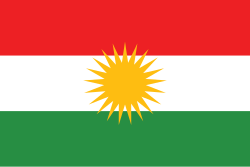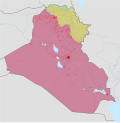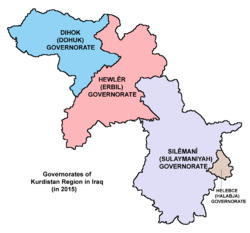Kurdistan Region
The Kurdistan Region (Kurdish: هەرێمی کوردستان, romanized: Herêma Kurdistanê) is an autonomous republic in northern Iraq.[12]
| |
|---|---|
| Anthem: ئَهَى رَهْقَىبُ, Ey Reqîb (Kurdish) (English: "O Enemy") | |

| |
| Sovereign state | Iraq |
| Autonomy founded | 19 May 1992[1] |
| Autonomy recognized | 15 October 2005[2] |
| Capital | Erbil (de facto) Kirkuk[1] (de jure) 36°04′59″N 44°37′47″E / 36.08306°N 44.62972°ECoordinates: 36°04′59″N 44°37′47″E / 36.08306°N 44.62972°E |
| Official languages | Kurdish[1] |
| Ethnic groups (2004[1]) | Recognized ethnicities: |
| Religion |
|
| Demonym(s) | Kurd, Kurdish |
| Government | Parliamentary republic |
• President | Nechirvan Barzani |
• Prime Minister | Masrour Barzani |
• Deputy Prime Minister | Qubad Talabani |
| Legislature | 111-seat Kurdistan Parliament |
| Area | |
• Total | 41,220[7] km2 (15,920 sq mi) |
| Population | |
• Estimate | 7,222,747 (2018)[8] |
| GDP (PPP) | 2015[9] estimate |
• Total | $26.5 billion[9] |
• Per capita | $7,000[9] |
| Gini (2012) | 32[10] medium |
| HDI | 0.732[10] high |
| Currency | Iraqi dinar, United States dollar |
| Time zone | UTC+3 (AST) |
| Driving side | right |
| Calling code | 964 |
| Internet TLD | .krd |
Iraqi Kurdistan
Iraqi Kurdistan or Southern Kurdistan [12](Kurdish: بَاشُوُورَى كُورْدِسْتَانْ, romanized: Başûrê Kurdistanê)[13][14] [15]is the Kurdish-populated part in the north of Iraq. It is considered one of the four parts of "Kurdistan" in West Asia, which also includes parts of southeastern Turkey (Northern Kurdistan), northern Syria (Western Kurdistan), and northwestern Iran (Eastern Kurdistan).[16] As with the rest of Kurdistan, and unlike most of the rest of Iraq, the region is inland and mountainous.
Government
The government of the Kurdistan Region is the Kurdistan Regional Government (KRG). Its de facto capital is Erbil, called Hewlêr in Kurdish. Although the Iraqi Kurdistan constitution claims Kirkuk as the capital.[15]
The government has ministries, such as Ministry of Peshmerga Affairs.
Geography
The Kurdistan region of Iraq is an autonomous region in northern Iraq. It borders Iran in the east, Turkey in the north, and Syria in the west. The region encompasses most of Iraqi Kurdistan, which is the southern part of the greater geographical region of Kurdistan. The region lies between latitudes 34° and 38°N, and longitudes 41° and 47°E. Most of the northern and northeastern parts of the region are mountainous, especially those bordering Turkey and Iran. The region has several high mountains and mountain ranges. Other areas of the region are hills and plains, which make up the central and most southern parts of the region.[13]
Administrative divisions
The Kurdistan Region is divided into four governorates (Kurdish: پارێزگا, Parêzga): the governorates of Erbil, Sulaymaniyah, Duhok, and Halabja. Each of these governorates is divided into districts, for a total of 26 districts. Each district is also divided into sub-districts. Each governorate has a capital city, while districts and sub-districts have 'district centers'. Duhok Governorate also has a major city called Zaxo.[17]
Demographics
Due to the lack of a good census, the exact population and demographics of Kurdistan Region are unknown, but the government has started to publish more detailed data. The population of the region is extremely difficult to make sure, as the Iraqi government has historically sought to lower the importance of the Kurdish minority while Kurdish groups has had a habit to distort the numbers.Based on available data, Kurdistan has a young population with an estimated 36% of the population being under the age of 15.[18][19]
Kurdistan Region Media
Himno Nacional de Kurdistán*Kurdistan National Anthem (*Autonomous Federal Entity of Iraq) *"ئەی ڕەقیب" /"Ey Reqîb" ("Oh Enemy")*Himno Nacional de Kurdistán (*Entidad Federal Autónoma de Irak) Kurdistan and Republic of Mahabad audio
The region uses the Iraqi flag in official ceremonies alongside the Flag of Kurdistan despite reluctance.
A valley in the north of the region, through which the Great Zab flows
Present territory controlled by the Kurdistan Region in the context of the Iraqi conflict
Mudhafaria Minaret in the Minare Park, Erbil
Chaldean Catholic Mar Yousif Cathedral in Ankawa
References
- ↑ 1.0 1.1 1.2 1.3 1.4 1.5 "Kurdistan: Constitution of the Iraqi Kurdistan Region". 14 April 2004. Retrieved 30 August 2019.
- ↑ Joseph R. Rudolph Jr. (2015). Encyclopedia of Modern Ethnic Conflicts, 2nd Edition. p. 275.
- ↑ Saatçi, Suphi (2018), "The Turkman of Iraq", in Bulut, Christiane (ed.), Linguistic Minorities in Turkey and Turkic-Speaking Minorities of the Periphery, Harrassowitz Verlag, p. 357, ISBN 978-3447107235
- ↑ Refugees, United Nations High Commissioner for (2 September 2016). "Iraq: Information on the treatment of atheists and apostates by society and authorities in Erbil; state protection available (2013-September 2016)". Refworld. Canada: Immigration and Refugee Board of Canada. Retrieved 31 August 2019.
- ↑ "Kurdistan, the only government in Middle East that recognizes religious diversity" (in en). Kurdistan24. 10 April 2017. https://www.kurdistan24.net/en/culture/321804d4-5b58-4008-848d-e1cc263230b4/kurdistan--the-only-government-in-middle-east-that-recognizes-religious-diversity. Retrieved 31 August 2019.
- ↑ "Country Information and Guidance Iraq: Religious minorities" (PDF). Government of the United Kingdom. August 2016: 13. Retrieved 31 August 2019.
{{cite journal}}: Cite journal requires|journal=(help) - ↑ Almas Heshmati, Nabaz T. Khayyat (2012). Socio-Economic Impacts of Landmines in Southern Kurdistan. p. 27.
- ↑ "Demographic Survey - Kurdistan Region of Iraq" (PDF). Relief Web. July 2018. Retrieved 30 August 2019.
- ↑ 9.0 9.1 9.2 "Erbil International Fair" (PDF). aiti.org.ir. Archived from the original (PDF) on 31 August 2019. Retrieved 30 August 2019.
- ↑ 10.0 10.1 "Iraq Human Development Report 2014" (PDF). p. 29. Archived from the original (PDF) on 10 October 2017. Retrieved 30 August 2019.
- ↑ "A Reading for the Law of Protecting Components in Kurdistan" (PDF). July 2015. Retrieved 15 September 2019.
- ↑ 12.0 12.1 Everett-Heath, John, ed. (2020). "Iraq (Al 'Irāq), (Mesopotamia)". Concise Oxford Dictionary of World Place Names (6th ed.). Oxford University Press. doi:10.1093/acref/9780191905636.001.0001. ISBN 978-0-19-190563-6.
- ↑ 13.0 13.1 "Gobierno Regional del Kurdistán | Geography". 2022-07-31. Archived from the original on 2022-07-31. Retrieved 2024-06-28.
{{cite web}}: CS1 maint: bot: original URL status unknown (link) - ↑ "مێژوو "وارماوا" له كوردستان". 2022-08-09. Archived from the original on 2022-08-09. Retrieved 2024-07-02.
{{cite web}}: CS1 maint: bot: original URL status unknown (link) - ↑ 15.0 15.1 "UNPO: Kurdistan: Constitution of the Iraqi Kurdistan Region". www.unpo.org. Retrieved 2024-06-28.
- ↑ Khalil, Fadel (2023-07-03). Kurden heute - Fadel Khalil - Google Books. Europaverlag. ISBN 978-3-203-51160-3. Archived from the original on 2023-07-03. Retrieved 2024-07-02.
{{cite book}}: CS1 maint: bot: original URL status unknown (link) - ↑ "Kurdistan Region Statistics Office". 2016-01-19. Archived from the original on 2016-01-19. Retrieved 2024-06-28.
{{cite web}}: CS1 maint: bot: original URL status unknown (link) - ↑ Stansfield, Gareth R. V. (2017-10-14). Iraqi Kurdistan: Political Development and Emergent Democracy - Gareth R. V. Stansfield, Jomo - Google Books. Routledge. ISBN 978-1-134-41416-1. Archived from the original on 2017-10-14. Retrieved 2024-06-28.
{{cite book}}: CS1 maint: bot: original URL status unknown (link) - ↑ "The people of the Kurdistan Region". 2012-11-06. Archived from the original on 2012-11-06. Retrieved 2024-06-28.
Notes
- ↑ The written language of the Iraqi Turkmen is based on Istanbul Turkish using the modern Turkish alphabet.[3]











